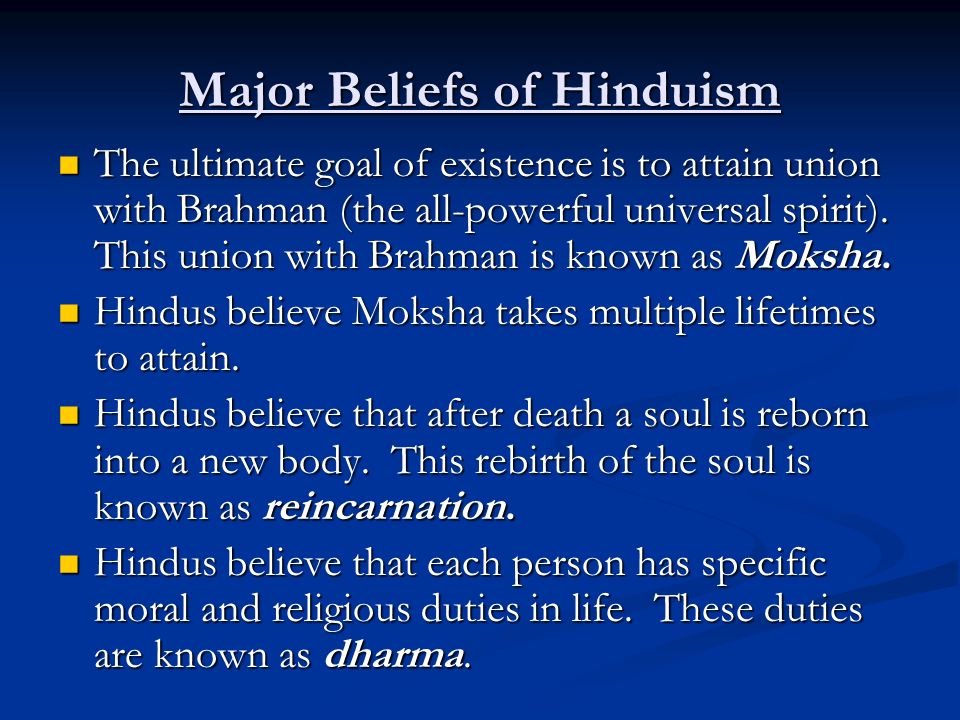
Hence good deeds are the result of good and the bad ones are the result of evil action. However this does not mean that Hinduism lacks cohesion as dharma karma and the Hindu deities are amongst the beliefs that unite all followers of the faith.

Not act fraudulently be dishonest or a liar in life.
What are the major beliefs of hinduism. In Hinduism it is believed that a human is born not only for just one goal but four goals i Dharma Dharma means responsibility. One should complete his responsibility before dying. Ii Artha Artha means wealth and success.
Dharma Karma Artha and Moksha are the four major beliefs of Hinduism Other major beliefs of Hinduism are the concept of reincarnation and it is also the central belief in Hinduism. Reincarnation means the soul or Atman takes a new body after death and it grows and matures and repeats this cycle until it attains Moksha. Here are some of the key beliefs shared among Hindus.
Hindus pursue knowledge and understanding of the Truth. The very essence of the universe and the only Reality. According to the Vedas Truth is One but the wise express it in a variety of ways.
Brahman is Truth and Reality. Hindus believe in the importance of the observation of appropriate behavior including numerous rituals and the ultimate goal of moksha the release or liberation from the endless cycle of birth. Moksha is the ultimate spiritual goal of Hinduism.
How does one pursue moksha. Basic beliefs of Hinduism are reincarnation and Karma. The other main Hinduism beliefs include soul Dashavataram belief in God etc.
The power upholds all parts of the universe but Hindus do not worship the concept. Though many perceive Hinduism as a polytheistic religion its philosophy is much more nuanced. Hindus believe in one supreme god however they believe God can manifest in many different forms.
Hinduism follows iconographical beliefs and practices related to Karma. Karma is the literal meaning of the deeds to our actions. Hence good deeds are the result of good and the bad ones are the result of evil action.
Hindus would wish like living a life attributed by karma those results in the endless cycle of life. The common bonds uniting all Hindus into a singular spiritual body are the laws of karma and dharma the belief in reincarnation all-pervasive Divinity the ageless traditions and our Gods. Our religion is a religion of closeness one to another because of the common bond of loving the same Gods.
It is the mainstay of the basic moral law of Hinduism. People are rooted in Satya the greatest truth unity of all life. One should be truthful.
Not act fraudulently be dishonest or a liar in life. Further a true person does not regret or brood over losses caused by speaking truth. The following is a brief summary of the main beliefs and practices of Hinduism in a nutshell.
Readers are requested to note that since Hinduism is a complex religion and this being a condensed presentation of its essential features there can be exceptions to what you may find here in some sects schools and sub sects. Hindus believe in the doctrines of samsara the continuous cycle of life death and reincarnation and karma the universal law of cause and effect. One of the key thoughts of Hinduism is.
Hinduism is considered to be one of the most tolerant religions in the world. One of the basic beliefs of Hinduism entails attaining moksha from the cycle of rebirth. Hinduism is not just a faith.
It is the union of reason and intuition that cannot be defined but is only to be experienced. No One True Religion. Hindus believe that there are many paths to God.
There is not one true religion or one right way to find Brahman. Historically Hindu societies have operated within a strict form of caste system in which one was born into a specific class that would determine ones career and place in society. Members were expected to marry within their caste and work the trades of their caste.
Hinduism major world religion originating on the Indian subcontinent and comprising several and varied systems of philosophy belief and ritual. If the Indus valley civilization 3rd2nd millennium BCE was the earliest source of Hindu traditions then Hinduism is the oldest living religion on Earth. The relative flexibility of Hinduism aided the spread of this transmission since it lacks a single authoritative text or religious authority.
However this does not mean that Hinduism lacks cohesion as dharma karma and the Hindu deities are amongst the beliefs that unite all followers of the faith. Indias first major religion. Hinduism is not just a religion but it was a way of life.
Brahman - name of one supreme god. Multiple Gods - gods and goddesses represented Brahmans various powers and qualities. Dharma - law obligation and duty Karma - governs what happens to peoples soul after death.
The three basic teachings of Hinduism are Dharma Karma and Moksha. Hinduism is prevalent in India and is based on the Vedas which are four sacred texts. Dharma is the religious duty of people to follow the principals of the cosmic order including the rules that guide the morality of all human beings.